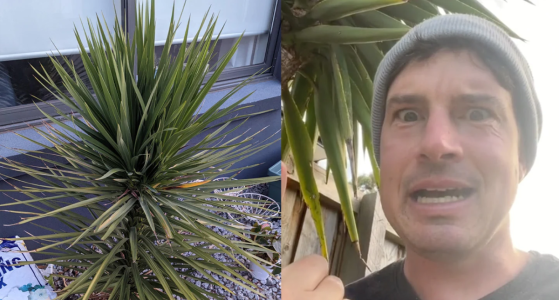This Invasive Plant is Wreaking Havoc in Aussie Gardens - Here's How to Stop it Before It's Too Late!
By
Gian T
- Replies 6
Australia's love affair with gardening is well-known, with many of us taking pride in our lush backyards and carefully curated plant collections. However, there's a dark horse in the mix that's causing gardeners across the nation to raise the alarm. An invasive plant, seemingly innocent at first glance, is threatening to wreak havoc on our beloved green spaces and even our homes.
The plant in question is the yucca, a species that, while aesthetically pleasing with its sword-like leaves and woody stems, harbours a destructive secret beneath the soil. Its roots, known for their aggressive and expansive nature, have the potential to cause significant damage to the infrastructure they encounter. This includes houses, fences, drains, and concrete structures, making it a less-than-ideal choice for residential gardens.
The issue came to light recently when a concerned homeowner shared an image on social media of a young yucca plant growing perilously close to their house. The post quickly caught the attention of gardening experts, including Steven from Zani’s Gardening, who advised that the plant be removed immediately to prevent future structural damage.
Steven's advice is not to be taken lightly. Yuccas, which are native to Mexico, were once a popular choice for Australian gardens, especially during the early 2000s. They were favoured for their modern look and were planted by the millions along poolsides and fence lines. However, the trend has taken a turn for the worse as the invasive nature of their root systems has become apparent.
The problem with yuccas is not just their roots. They also pose a physical threat to humans and pets due to the sharpness of their leaves. In fact, a study published in the UK journal Clinical Otolaryngology highlighted a spike in gardening-related ear injuries, with 28 people presenting to the Royal Victorian Eye and Ear Hospital in Melbourne over a five-year period due to yucca plant spikes.
The backlash against yuccas has been strong, with many Australians sharing their negative experiences. From stories of relentless regrowth despite efforts to remove the plants to tales of structural damage to homes, it's clear that the yucca is no longer the darling of the Aussie garden.
So, what can be done if you find yourself with a yucca problem? Steven recommends cutting up and burning the plants to ensure they do not regrow from any remaining fragments. For those who still appreciate the look of yuccas, it's advised to grow them in pots where their roots can be contained, or on open farms where they have ample space without the risk of damage.
As we continue to nurture our gardens, it's crucial to stay informed about the plants we introduce into our ecosystems. The yucca serves as a reminder that not all plants are suitable for every environment, and sometimes, the risks outweigh the aesthetic benefits.
 For our green-thumbed readers, have you had any encounters with the yucca or other invasive plants in your garden? Share your experiences and tips for dealing with these unwelcome guests in the comments below. Remember, the beauty of our gardens lies not only in their appearance but also in their harmony with our homes and local wildlife. Let's keep our Aussie backyards safe and enjoyable for everyone.
For our green-thumbed readers, have you had any encounters with the yucca or other invasive plants in your garden? Share your experiences and tips for dealing with these unwelcome guests in the comments below. Remember, the beauty of our gardens lies not only in their appearance but also in their harmony with our homes and local wildlife. Let's keep our Aussie backyards safe and enjoyable for everyone.
The plant in question is the yucca, a species that, while aesthetically pleasing with its sword-like leaves and woody stems, harbours a destructive secret beneath the soil. Its roots, known for their aggressive and expansive nature, have the potential to cause significant damage to the infrastructure they encounter. This includes houses, fences, drains, and concrete structures, making it a less-than-ideal choice for residential gardens.
The issue came to light recently when a concerned homeowner shared an image on social media of a young yucca plant growing perilously close to their house. The post quickly caught the attention of gardening experts, including Steven from Zani’s Gardening, who advised that the plant be removed immediately to prevent future structural damage.
Steven's advice is not to be taken lightly. Yuccas, which are native to Mexico, were once a popular choice for Australian gardens, especially during the early 2000s. They were favoured for their modern look and were planted by the millions along poolsides and fence lines. However, the trend has taken a turn for the worse as the invasive nature of their root systems has become apparent.
The backlash against yuccas has been strong, with many Australians sharing their negative experiences. From stories of relentless regrowth despite efforts to remove the plants to tales of structural damage to homes, it's clear that the yucca is no longer the darling of the Aussie garden.
So, what can be done if you find yourself with a yucca problem? Steven recommends cutting up and burning the plants to ensure they do not regrow from any remaining fragments. For those who still appreciate the look of yuccas, it's advised to grow them in pots where their roots can be contained, or on open farms where they have ample space without the risk of damage.
As we continue to nurture our gardens, it's crucial to stay informed about the plants we introduce into our ecosystems. The yucca serves as a reminder that not all plants are suitable for every environment, and sometimes, the risks outweigh the aesthetic benefits.
Key Takeaways
- A gardener has warned that yucca plants, which can have invasive root systems, should be removed immediately if planted near houses.
- Steven from Zani’s Gardening advised that yuccas are not suitable around homes due to their potential to damage infrastructure like drains and fences.
- There is a shared concern among Australians regarding the problems caused by yucca plants, including damage to property and persistent regrowth when not entirely removed.
- Yucca plants, known for their spiky leaves, have also been associated with a spike in gardening-related injuries, particularly to the ear.








